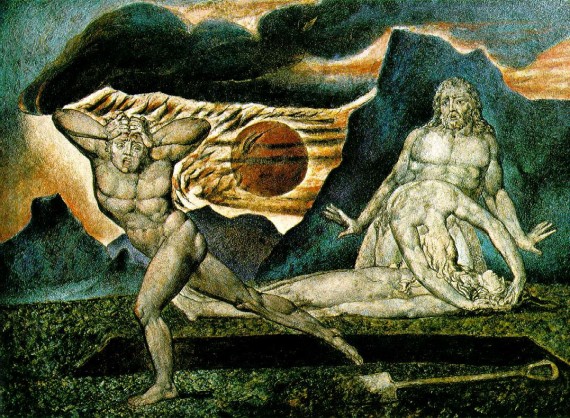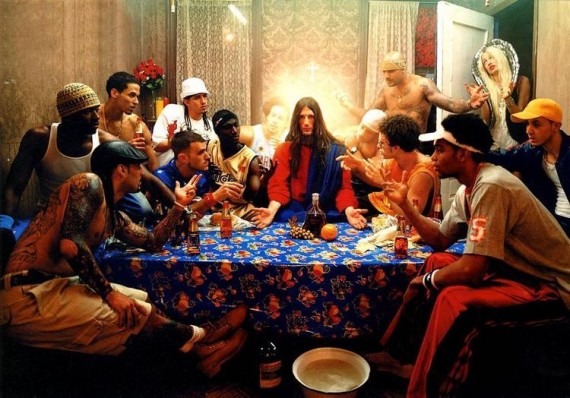I have a new eBook coming out soon. The following post hits on one of the themes I write about in this book. To get this new book when it comes out, make sure you have subscribed to receive my blog posts and eBooks by email.

There is a reason why the very first murder in the Bible is a fratricide – a murder between brothers. What is that reason?
Because every murder is a murder between brothers. When Cain murdered his brother, Abel, it represented every murder in history.
When one person murders another person, they are murdering their brother or sister. Every homicide is fratricide.
But the significance and symbolism goes deeper still, especially for those of us who have never murdered anybody.
The Cycle of Murderous Revenge
The blood of Abel cries out from the ground for justice, for revenge. This is the cycle of murder which is behind every murder as well. Most murderers do not think of themselves as murderers, but simply as vigilantes of justice. Their murder of another person was justified. They were righting a wrong, killing a criminal, or invoking vengeance upon some injustice. Every murderer is able to justify his own murder.
This we also see in Genesis. After Cain kills his brother, Lamech get injured by a boy, and retaliates with murder. But he feels his murder was justified, and says that if anyone tries to re-retaliate against him by killing him, vengeance will come upon them seventy times over (Gen 4:24). The cycle of vengeance and retaliation goes from hurt to murder to mass-murder, and eventually, to the place where “the entire earth was filled with violence” (Gen 6:5, 11).
But the cycle of violence did not stop with violence covering the earth. Whereas a rivalry between brothers led to the murder of one (Genesis 4), and the rivalry between all people led to murderous violence among all (Genesis 6-9), humanity eventually turned their rivalry upon God Himself and sought to place themselves upon His throne (Genesis 11:1-9). But the only thing that ever resulted from all this murderous rivalry and violence was death (Genesis 5), death (Genesis 10), and death (Genesis 11:10-32).
This is why the only proper response to murder is forgiveness. Without forgiveness, murder leads to a cycle of violence that ends only in annihilation.
But who can have the courage (and wisdom) to respond to murder with forgiveness? Nobody! At least, I do not think I have the courage to forgive those who murdered one of my loved ones, or to forgive those who attempt to murder me. In this world, the only way, it seems, to keep from being murdered is to be stronger than the one who wants to murder you, and to murder him before he murders you.
And yet, we do have Jesus as our perfect example of how to treat those who murder us. As Jesus was being murdered on the cross by His brethren, He asked God to forgive them.
This is why the author of Hebrews says that Jesus “spoke a better word than the blood of Abel” (Heb 12:24). And what word did Jesus speak as His own blood was being spilled by His brethren? Though the blood of Abel cried out for vengeance from the ground, as the blood of Jesus poured from His veins on the cross, He cried out, “Father, forgive them, for they know not what they do!” (Luke 23:34).
Can we do this? I am not so sure.

A Second Look at the First Murder
Maybe it begins by going back to look once again at the first murder, the founding fratricide. If we look at what happened when Cain murdered his brother, we may be able to get a glimpse of our own hearts also when we have murderous hate for others.
If we go back and look at why Cain murdered his brother, we discover that it was because Cain was trying to please and appease God. His parents had “stolen” God’s fruit, and Cain, as the “promised seed,” was the one who would get his family back into God’s good graces. So He became a farmer and when he received his harvest, he tried to give God back His fruit.
And God’s answer to Cain was, “Sin is crouching at your door, and it will destroy you.” What sin was that? The sin of trying to make amends with God!
In essence, God looked at Cain’s offering of fruit and said, “I don’t want the fruit. You do not understand. I am not angry at you. I do not want sacrifices and offerings. I just want you. I want to live life with you. Go ahead, keep the fruit for yourself. Eat it. Enjoy it. It’s yours.”
But Cain believed that God’s justice had been violated, that His honor had been destroyed, and Cain believed that something must be done to restore God’s honor, and make the world “right” once again. Cain believed that justice must be served, that order must be re-introduced, and that satisfaction must be made.
Most importantly, Cain believed it was his responsibility to make things right, to restore order, and to serve justice. This feeling is the foundational emotion for murder.
For when Cain saw that God had a good relationship with Abel, Cain believed that Abel would become the one who would rescue his family from exile. He didn’t like to have a rival, and so he murdered his brother.
In this way, God’s promise that eating the forbidden fruit would lead to death was fulfilled in the first generation of humans after Adam and Eve were exiled from the Garden of Eden. And it was a murder of brother against brother. This murder of brothers began a cycle of contagious violence, murder, and death that spun out of control and enveloped the whole earth.
As such, it is not an exaggeration to say that violence is the most prominent theme in the Old Testament text. No human activity is mentioned as frequently in the Old Testament as the activity of violence. Raymund Schwager states that the Old Testament books “contain over six hundred passages that explicitly talk about nations, kings, or individuals attacking, destroying, and killing others. … No other human activity or experience is mentioned as often” (Must There be Scapegoats? p. 47).
Yet there is something more troubling than this.
Does God retaliate against violence with more violence?
 For all the mentions of human violence, references to divine violence appear almost twice as often.
For all the mentions of human violence, references to divine violence appear almost twice as often.
Again, Schwager provides the statistics: “The theme of God’s bloody vengeance occurs in the Old Testament even more frequently than the problem of human violence. Approximately one thousand passages speak of Yahweh’s blazing anger. … No other topic is as often mentioned as God’s bloody works. A theology of the Old Testament revelation that does not specifically deal with this grave and somber fact misses from the very start one of the most central questions …” (Must There be Scapegoats? p. 55).
What are we to make of this?
How can Jesus call us to bless and forgive our enemies when it appears from Scripture that God does the exact opposite? Furthermore, how can Jesus be the exact representation of God, when everything Jesus taught about God seems to contradict what we see about God in the Old Testament?
A straightforward reading of the Old Testament text seems to indicate that as violent as humanity can be, God outdoes us all; God is more bloody and violent than all humanity combined.
And if this is the case, is it any wonder that humans are murderously violent — just like their God in whose image and likeness they are made?
Between the violence of humanity and violence of God, it is obvious that “violence is the most central theme in the Old Testament” (Must There be Scapegoats? 66).
But maybe, just maybe, despite all our scholarship, studies, and sermons, we have missed the main revelation of the Bible. Maybe, just maybe, the Bible we want is not the Bible God gave us. Maybe, just maybe, the Bible is not a book of spiritual devotion or “a morally reassuring manual of religious piety” (Bailie, Violence Unveiled, 135).
Maybe, just maybe, we have completely ignored the main truth of Scripture.
The Most Ignored Truth in Scripture
And what truth is that?
That we are the violent ones, and there is no violence in God at all.
That God appears violent because we have made Him to be the scapegoat for our own violence.
That God appears violent to us only because we do not want to admit our own violence and so blame Him for it. In our scapegoating violence, we have made God the universal scapegoat for all violence.
We have, each one of us, killed our brothers. And the blood of every victim in Scripture and in history cries out from the ground. And when God appears and says, “What have you done?” we reply, along with Cain, that we are the victims, that we are the ones God has wronged, that if He would treat us more fairly, life would turn out better.
In our hearts, we secretly desire to become God. We secretly know in our hearts that if we were running the world, we could do a better job than God. In our hearts, we secretly believe that God has wronged us, not treated us fairly, and shows favoritism to others. And so we grow in our resentment towards God. We secretly wish that we could replace God.
With this secret desire in our hearts, we set out to “be God” to the world by doing the things He doesn’t seem to be doing. We try to make things right. We try to enact justice. We try to retaliate against wrongdoers.
And when God whispers into our hearts, “Be careful! Sin is crouching at your door!” we try to protect ourselves from this sin by “righteously” killing “God’s rivals,” who are really only our rivals.
When we place ourselves up as the bringers of peace, as God’s spokesman in the world, as the ones who will restore humanity to the garden, and then God seems to favor someone else who is “doing it all wrong,” we get jealous and envious, and we set out to kill and destroy them so that we ourselves do not lose our privileged position.
This desire to be God leads to a rivalry against others, which leads to murdering our rivals, as we think God should do.
And thus goes Scripture and history. We behave violently toward others. God says, “What have you done?” and we say, “Don’t punish me. It was you. You drove me away. If you would only treat me fairly, I would not have had to do what I did. I got a bad hand in life. I was not treated rightly. If I had not done what was necessary, I would not have received what was rightfully mine.
So we have always blamed God. We blame Him for not running the world correctly. We blame Him for not killing our rivals, and we blame Him for not setting things straight in the world.
And if God were a human, taking all this blame, He would set out to prove His innocence. He would set out to kill us in retaliation for trying to take His place, for trying to be a rival to God, for questioning how He runs the world, and for killing others in His name when He had nothing to do with such murder.
But this is not what God did when faced with all the blame for our sin and shame. God did not behave like a human would, but He showed us how a human could behave.
And He did this in Jesus. In Jesus, God bore the blame. God took the shame.
 Though innocent of any wrongdoing, God, in Jesus, let us blame Him for every wrongdoing.
Though innocent of any wrongdoing, God, in Jesus, let us blame Him for every wrongdoing.
And then He let us kill Him in God’s name.
Why did we kill Jesus? To set things right. To restore order. To defend God’s righteousness. To bring justice.
We were the ones who had the plan to set things right and bring humanity back into Paradise, but the teachings and example of Jesus messed everything up, and when it appeared that God favored Jesus more than all our religious rules, regulations, and restrictions, we knew that He had to be stopped.
We brought our unwanted and unneeded and unasked-for offerings of fruit in order please and appease a God who was not angry at us in the first place, and when we saw that our brother, Jesus, was accepted by God, we became jealous, and so we killed him.
And yet though the blood of Abel cried out from the ground for vengeance, the blood of Jesus cries out from the cross for forgiveness.
In this way, while the sin of the first man, Adam, brought about the murder of brother against brother and a never-ending cycle of retaliatory vengeance, the offering of the second Man, Jesus, also brought about the murder of brother against brother (and of man against God), but in so doing, Jesus offered a word of forgiveness, which put an end to the need for retaliatory vengeance. Of all the murders in the world, God alone could have righteously retaliated for the unjust murder of His innocent Son, but instead, He forgave, showing that the only way to peace, love, and unity is through forgiveness.
So have you been wronged? Follow the example of Jesus. Stop the cycle of retaliation by offering forgiveness instead of vengeance.
Only in this way can both Cain and Abel come together and bring their human family back to the garden.






 Worse still, he had walked into their church the previous Sunday and tore down the book store, overturned the tables and threw the cash register through the window, he then made a whip and chased the pastor out of the building, declaring he was turning God’s house into a den of thieves.
Worse still, he had walked into their church the previous Sunday and tore down the book store, overturned the tables and threw the cash register through the window, he then made a whip and chased the pastor out of the building, declaring he was turning God’s house into a den of thieves.
 And I mean REALLY loves them. No conditions. No limits. No ifs, ands, or buts.
And I mean REALLY loves them. No conditions. No limits. No ifs, ands, or buts. 
 Usually, when we think about God, we tend to put God in the place of these famous people we want to know. We think, “It would be so cool if God and I were on a first-name basis. If I could call God any time I wanted. If we could hang out like best friends.”
Usually, when we think about God, we tend to put God in the place of these famous people we want to know. We think, “It would be so cool if God and I were on a first-name basis. If I could call God any time I wanted. If we could hang out like best friends.” 


